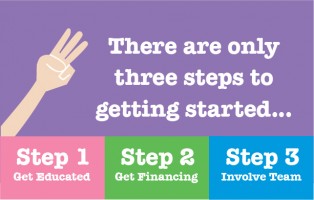 It’s time to lay out the basic steps to buy your first property. Granted, we’re leaving out the fine print here but this article will explain, simply, the process you can expect when you buy your first property and they are:
It’s time to lay out the basic steps to buy your first property. Granted, we’re leaving out the fine print here but this article will explain, simply, the process you can expect when you buy your first property and they are:
Get Educated Prepare yourself and rehearse your strategy over and over again. Where are you going to buy and what type of transaction will it be? Is this for a long term hold? If so, what is the current market rent for the area and will the rent be more than enough to cover the mortgage, taxes, insurance and related expenses. Does the property need some work? If so, how much and will the costs to repair be more than the net profit you expect? Are you buying in an area that is on its way down or are property values at minimum holding steady? Good schools in the area? Knowing as much as you can about your first deal before going in will steady your nerves and mentally prepare for success.
Get Financing In Order Can you afford the purchase? For a long term acquisition you’ll need to obtain conventional financing from a bank or mortgage company. These loans require at least 20 percent down plus an allotment for closing costs. For your first property, lending guidelines won’t allow the rental income from the unit to offset the new mortgage. Once you’ve been a landlord and can document your income and expenses with your federal income tax returns, a lender can then allow rental income to be used on your second investment, but not your first. Speak to a mortgage lender and obtain your preapproval letter knowing how much you can qualify for and much cash you’ll need.
Is this a fix and flip? You may need the services of a private lender as conventional loans typically can’t finance a property in poor condition. A private lender can provide the funds needed to acquire and rehab the unit.
Get Your Team Involved Part of your business plan should include the formation of your team. Your team will be made up of a professional, full time real estate agent, a contractor and a property inspector. Have contacts that can provide you with a title insurance report and to schedule your closings. When you buy your first rental property, working with a team allows you to leverage the talents of others that have spent years perfecting their trade.
Once you’ve identified your first investment property, your agent will write up an offer on a sales contract and present to the seller. That’s your 1-2-3 way to buy your very first property.




